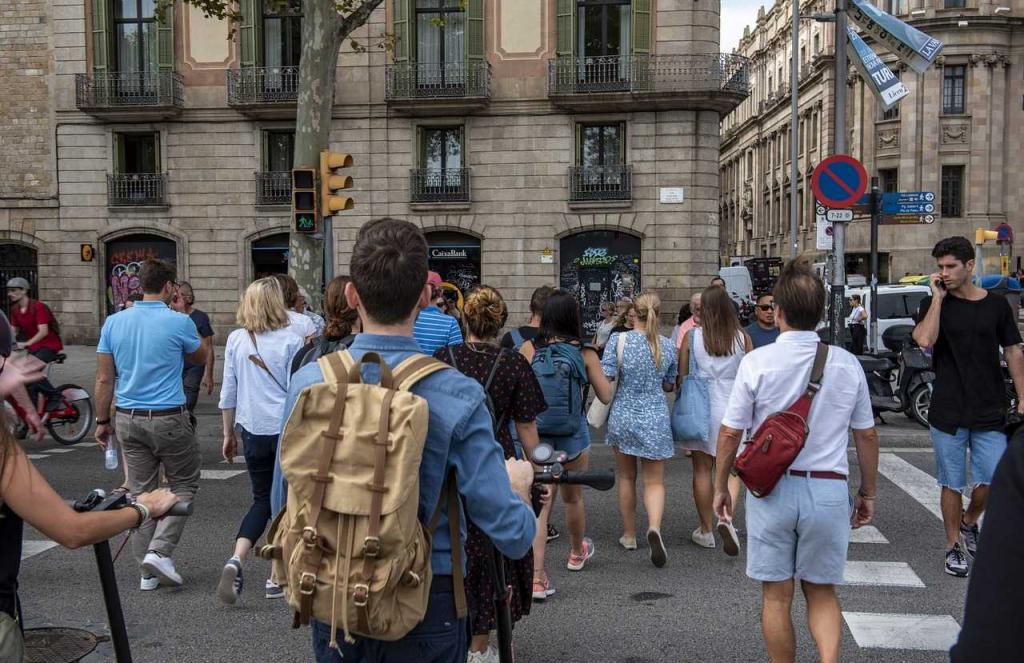Thessaloniki gets ready for its metro launch in November
The underground rapid transit lines have been under construction for almost two decades due to various project delays
 TheMayor.EU logo
TheMayor.EU logo 
Barcelona is trying to balance its tourism appeal with the needs of its local residents, Source: Pixabay
The amended regulation is supposed to enter into force in March 2023
Starting from 1 March 2023, tour guides in Barcelona can only lead tourist groups that do not exceed 20 members. The measure is specifically aimed at limiting the harmful tourism impact on the daily life of residents in the old town quarter known as Ciutat Vella.
The new ordinance represents an update to the initial regulation, which stated that groups could have up to 30 people but only up to 15 in certain areas. Given the complications that would cause tour operators in organizing the logistics, the city authorities decided to amend the rule to a more compromising number.
The decree is something "never seen before" and this is why the city council set a six-month validity. Officials preferred for summer to be part of this trial, therefore the decree will be in force from March until September when a new decree will come into effect indefinitely.
"We are telling official tour guides in which way they have to work to respect our streets and squares," explained Jordi Rabassa, a councillor from the old town district, as quoted by Catalan News. The idea of the City Council is to maintain a balance between the tourism industry and the neighbourhood’s economic and social lives.
On 1 March, a campaign will be launched to explain the new decree and the possible sanctions that range from 1,500 to 3,000 euros in the cases of infractions. According to media sources, however, the rule for one-way street direction for groups will be scrapped.
The city decree also means that tour guides will have to spend less time giving explanations at monuments in order to prevent human traffic jams. As the old town quarter has narrow streets and small squares, each of the squares will also have a defined capacity of how many tour groups there can be simultaneously at any moment. For example, the Placa de la Barceloneta can only host one group at a time.
Once officially in place, tour guides will have to use audio guides and confirm they will not use loudspeakers in order to reduce noise pollution.

The underground rapid transit lines have been under construction for almost two decades due to various project delays

Now you can get your wine in Talence by paying directly in Bitcoin

That’s because the state has to spend money on updating the railway infrastructure rather than subsidizing the cost of the popular pass

Rethinking renewable energy sources for the urban landscape

The examples, compiled by Beyond Fossil Fuels, can inform and inspire communities and entrepreneurs that still feel trepidation at the prospect of energy transition

Now you can get your wine in Talence by paying directly in Bitcoin

The 10th European Conference on Sustainable Cities and Towns (ESCT) sets the stage for stronger cooperation between the EU, national and local level to fast track Europe's transition to climate neutrality.

At least, that’s the promise made by the mayor of Paris, Anne Hidalgo

The underground rapid transit lines have been under construction for almost two decades due to various project delays

At least, that’s the promise made by the mayor of Paris, Anne Hidalgo

Hostal de Pinós is located in the geographical centre of the autonomous region

Despite its church-y name, the district has long been known as the hangout spot for the artsy crowds

Urban dwellers across the EU are having a say in making their surroundings friendlier to people and the environment.

Forests in the EU can help green the European construction industry and bolster a continent-wide push for architectural improvements.

Apply by 10 November and do your part for the transformation of European public spaces

An interview with the Mayor of a Polish city that seeks to reinvent itself

An interview with the newly elected ICLEI President and Mayor of Malmö

A conversation with the Mayor of Lisbon about the spirit and dimensions of innovation present in the Portuguese capital














